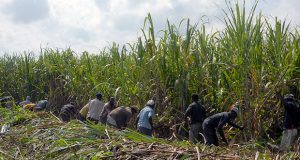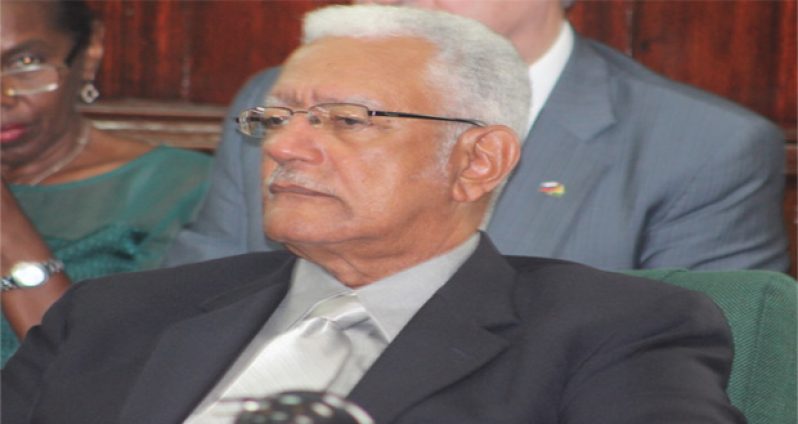THE Commission of Inquiry (CoI) into the ailing Guyana Sugar Corporation (GuySuCo) has recommended privatisation of the corporation as early as is practicable, with an aim to complete the process in three years.The long-awaited report, laid yesterday in the National Assembly, is also urging that the State divest itself of all assets, activities and operations currently associated with GuySuCo. “In the interval, as the privatisation process is awaited, the new management of GuySuCo must focus on basic essentials to rehabilitate the fields, factories and infrastructure of GuySuCo. There should be no accommodation for new projects, which will create demands on the limited funds. This is aimed at making the estates more saleable and attractive to investors, both local and foreign,” the report recommended.
It said a few expressions of interest, both formal and informal, have been received. While the ongoing process of amalgamating estates for obvious economies of scale may continue, the CoI does not recommend the closure of any estate at this time. Financial support will be needed in the short term, and this should be provided by the government on a timely basis, the report said. It is hoped that the recommendations will be implemented at the earliest possible time.
“The management of GuySuCo must immediately direct its attention and focus on reducing operational costs, especially that of employment; returning to basic agronomic practices, rehabilitating its factories, and strengthening supervision,” the list of recommendations concluded.
The current poor, unacceptable state of GuySuCo was engendered by several major issues, all of which were highlighted in the report.
MISMANAGEMENT
Among the issues highlighted were mismanagement of human, financial and material resources; absence of motivational and effective leadership, and lack of business acumen; unavailability of financial resources to fund, on a timely basis, essential capital and routine works; and a dearth of relevant experience and knowledge relating to the uniqueness of the sugar industry, notwithstanding some notable exceptions.
The Guyana Agricultural and General Workers’ Union (GAWU)’s insensitivity to the realities of the sugar industry, especially its deteriorating financial position and other challenges, was also listed as one of the main features which led to the current state of the corporation.
Sugar production began to decline in 2005. It dropped from 325,318 metric tonnes in 2004 to 216,358 tonnes in 2014. To cushion the trickle-down effect of this loss in production, the then PPP government poured billions into the corporation through subsidies. This year, GuySuCo received a $12B subsidy from the 2015 Budget.
But despite pumping 100 per cent of its revenue into wages and salaries for workers, the corporation, in the last month, has managed to reduce its $82B debt by some $4B.
BITTER-SWEET
The situation with sugar in Guyana was recently described as “bitter-sweet” by Minister of Agriculture, Noel Holder. His sentiments were grounded in the fact that, despite the years of failing, the industry, with considerable and prudent management in the past few months, has been able to surpass its production target of 227,443 tonnes this year. It has recorded a year-end production of 229,215 tonnes.
Minister Holder reminded the National Assembly yesterday that, prior to the inquiry, the sugar industry, for the past several years, had been producing less and less at greater and greater unit and total costs. Some 17,000 persons are directly employed by the industry, while another 60,000 are dependent on it. Sugar is a major source of foreign exchange for the Guyana economy.
Holder pointed out that the rising output costs and poor management threatened to position GuySuCo on the path of no return. To keep the industry afloat, the then People’s Progressive Party (PPP) government regularly doled out billions into the corporation, a practice which in the long run would have been unsustainable.
But the problems were many, Holder told the House. Sugar prices, particularly from the European Union (EU), have declined. Production, productivity and skilled labour also suffered; and together with ballooning costs, the Agriculture Minister said, the industry was made a “chronic loss maker,” dependent on government bailouts to survive.
EFFORTS REJECTED Going back as far as 1994, there were efforts to diversify the sugar industry, but those were given no heed by the then government. And with the closure of the Diamond and Leonora Estates, coupled with the quagmire the industry has found itself in under the PPP, the industry has come full circle since the 1980s, Minister Holder informed the House.
But, he said, the David Granger administration has faith in sugar, and will, through wide consultations involving all stakeholders, develop a plan to return sugar to profitability, while ensuring its long-term sustainability.
On June 4, 2015, the new government appointed an Interim Management Committee (IMC) to steady the affairs of GuySuCo, and has since made a number of observations. It has found that low morale pervaded the industry; staff felt threatened and insecure, as there existed an environment of fear in the industry; uncertainty between right and wrong prevailed; and the dominant atmosphere was “do what you were told or find another job.”
Holder told the National Assembly that the excessive control and less-than-competent management spring-boarded operating costs right through the roof.
POLITICAL DABBLING
This, he said, was allowed to happen as greater attention was paid to political pandering rather than sound decision-making.
“The corporation was suffering from poor marketing decisions by the then Chief Executive, who forwent a three-year agreement with Tate and Lyle for a one-year duration at a time when prices were declining…. It left the corporation exposed to the vagaries of world market prices,” Holder said.
Worse yet, he said, personnel at both the managerial and non-managerial levels had their services terminated, while others with years of experience were transferred in moves that smacked of vindictiveness.
“The procurement system was blatantly corrupted by the leadership. The West Demerara Estate was run down,” he said, pointing out that the situation with the others was no less foreboding, due largely to political interference.
In addition, agricultural research was marginalised, materials and skilled workmen were in short supply, and management and workers relations were adversarial to each other.
According to Holder, the appointment of the IMC has brought a great sense of relief to the GuySuCo management team. He said managers meet regularly, participate meaningfully in decision-making, and also meet with workers and their unions.
KEY INDICATORS
The IMC has established key performance indicators for each of the estates, and they are all closely monitored on a daily basis. “This pressure was maintained throughout the crop,” Holder reported, pointing out that this was along with a renewed focus on cost control and cash management.
The meetings with the unions, he said, were aimed at building good relations with the workers’ representatives, and relative calm prevailed until the Guyana Agricultural and General Workers Union (GAWU) was motivated to call a strike last October, and another in November. On both occasions, GAWU achieved nothing, while the workers lost wages. The corporation has since started to communicate directly with the workforce, as it contends that GAWU could not be relied upon to provide reliable information to the workers.
Holder told the National Assembly that all matters affecting workers and the management of GuySuCo are now being handled in a fair and transparent manner, and a decision was made to bring back experienced professionals to aid in the turnaround of the industry.
“Staff is responding better to the new administration; morale is considerably better [and], the industry has achieved and surpassed its production target this year,” the minister said.
It has not done so in a long time, and, Holder said, sugar is too valuable for its future to be taken lightly.
By Ravin Singh and Tajeram Mohabir




.png)









